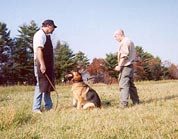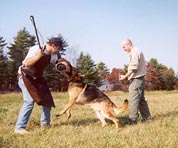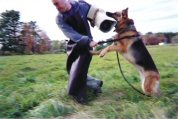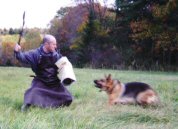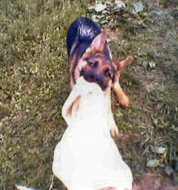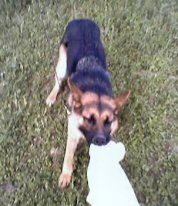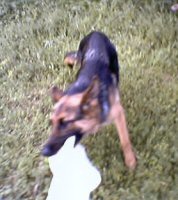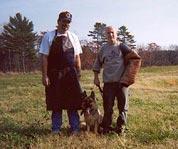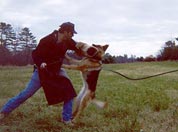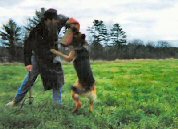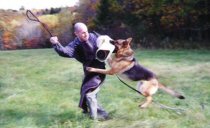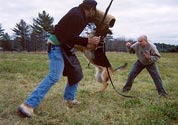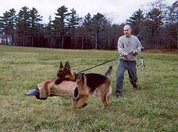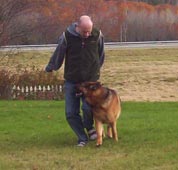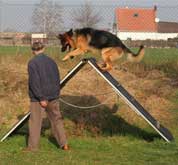|
Schutzhund is a performance event that tests a dog's character,
intelligence, courage and athleticism. Titles can be earned
at three levels: Schutzhund I, II and III (abbreviated SchH
I, etc.). To earn a title at each level, a dog must demonstrate
proficiency in tracking, obedience, and protection work by
successfully completing a series of exercises in each phase
in a single trial. The dog must also score a minimum of 70
of the possible 100 points in each phase.
Schutzhund: German word meaning "Protection Dog".
It refers to a sport that focuses on developing and evaluating
those traits in a dog that make them more useful and happier
companions to their owners.
While dogs of other breeds are also admitted to Schutzhund
trials, this breed evaluation test was developed specifically
for the German shepherd dog. Schutzhund is intended to demonstrate
the dog's intelligence and utility. As a working trial, Schutzhund
measures the dog's mental stability, endurance, structural
efficiencies, ability to scent, willingness to work, courage
and trainability.
This working dog sport offers an opportunity for dog owners
to train their dog and compete with each other for recognition
of both the handler's ability to train and the dog's ability
to perform as required. It is a sport enjoyed by persons of
varied professions, who join together in a camaraderie born
of their common interest in working with their dogs. Persons
of all ages and conditions of life, even those with disabilities,
enjoy Schutzhund as a sport. Often, it is a family sport.
|
Schutzhund is the most complete form of training ever
devised for the working dog. Why? Schutzhund training
is geared to the development of a working dog's natural
character. This produces the ultimate in family protection
and / or competition in Schutzhund trials and AKC obedience.
The tracking phase includes a temperament test by the
overseeing judge to assure the dog's mental soundness.
When approached closely on a loose leash, the dog should
not act shyly or aggressively. The track is laid earlier
by a person walking normally on a natural surface such
as dirt or grass.
|
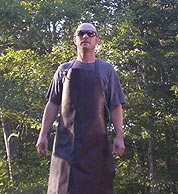
Let's Train!
|
|
The track includes a number of turns and a number of
small, man-made objects left by this person on the track
itself. At the end of a 30 foot lead, the handler follows
the dog, which is expected to scent the track and indicate
the location of the objects, usually by lying down with
the object between its from paws. The tracking phase
is intended to test the dog's trainability and ability
to scent, as well as its mental and physical endurance.
|
Tracking is basically the development of a German shepherd's
natural abilities and instincts and encourages confidence
in himself. Tracking is very enjoyable for the dog and handler
and helps to develop a happy, relaxed bond between them.
The obedience phase includes a series of heeling exercises,
some of which are closely in or around a group of people.
During the heeling, there is a gun shot test to assure that
the dog does not openly react to such sharp noises. Steady
nerves is a must for a well-bred German shepherd. There is
also a series of field exercises in which the dog is commanded
to sit, lie down and stand while the handler continues to
move. From these various positions the dog is recalled to
the handler. With dumbbells of various weights, the dog is
required to retrieve on a flat surface, over a one - meter
hurdle and over a six foot slanted wall (looks like a triangle).
The dog is also asked to run in a straight direction from
its handler on command and lie down on the second command.
Finally, each dog is expected to stay in a lying down position
away from its handler, despite distractions at the other end
of the obedience field, while another dog completes the above
exercises. All of the obedience exercises are tests of the
dog's temperament, structural efficiencies and very importantly,
its willingness to serve man or woman.
Obedience makes a dog a more enjoyable house companion as
it develops his character and confidence and adds to the personal
pride between man and dog. Schutzhund obedience looks at a
handler and dog as a team and puts much more emphasis on a
stable working relationship. This makes a dog more reliable
in every day situations.
|
The protection phases tests the dog's courage, physical
strength and agility. The handler's control of the dog
is absolutely essential. The exercises include a search
of hiding places, finding a hidden person (acting as
a human decoy) and guarding that decoy while the handler
approaches. The dog is expected to pursue the decoy
when a escape is attempted and to hold the grip firmly.
The decoy is searched and transported to the judge with
the handler and dog walking behind the latter at the
decoys right side. When the decoy attempts to attack
the handler, the dog is expected to stop the attack
with a firm grip and no hesitation.
|

Chris and Hilfe
|
The final test of courage occurs when the decoy is asked
to come out of a hiding place by the dog's handler from the
opposite end of the trial field. The dog is sent after the
decoy when he attempts to run away. Just when the dog is about
to catch the decoy, the judge signals the decoy to turn about
and run directly at the dog, threatening the dog with a stick.
All bites during the protection phase are expected to be placed
firmly on the padded sleeve and stopped on command and / or
when the decoy discontinues the fight. The protection tests
are intended to insure that the dog is neither a coward nor
a criminal menace.
Protection as trained for Schutzhund requires that the dog
have a reliable temperament and show courage without viciousness.
It is much more and complex and must not be compared to attack
training. The competition dog must make his own decisions
and use judgment. He works completely off lead and at a distance
from his handler. He is trained to alert and bark at the helper
until there is aggression or an escape attempt. At such time,
he must bite and hold but release automatically when the helper
ceases fighting. This provides a safety factor against overdone
aggression with little control. Because the dog must have
a stable disposition and intelligence, this will result in
a more trustworthy and reliable pet who loves his family and
will give his life to protect them.
There are three levels of the Schutzhund test:
For Schutzhund I, the dog must be at least 18 months
old and pass an initial temperament test by the judge. The
dog must heel on the leash and off, demonstrate the walking
sit, the walking down and the stay tests, as well as the
send out. It must retrieve on the flat and over a hurdle.
In tracking it must be able to follow a track laid by its
handler at least 20 minutes earlier. There are also protection
tests.
For Schutzhund II, the dog must be at least 19 months
old and must already have earned its Schutzhund I degree.
It must again pass all of the obedience and protection tests
required for the Schutzhund degree, but those tests for
Schutzhund II are made more difficult and require a greater
endurance, agility and above all control. There is an additional
retrieve required over the six foot slanted wall. In tracking,
the SchH II dog must be able to follow a track laid by a
stranger at least 30 minutes earlier.
For Schutzhund III, the master's degree, the dog
must be be at least 20 months old and must have earned the
SchH I and SchH II titles. Again, the tests are made far
more difficult. All exercises in obedience and protection
are demonstrated off leash. There is an addition of a walking
and a running stand. In tracking, the dog must follow a
track that was laid by a stranger at least 60 minutes earlier.
The track has four turns compared to the two turns for SchH
I and SchH II, and there are three objects rather than two,
that must be found by the dog. The picture of obedience
presented by an excellent Schutzhund III team is a beautiful
illustration of the partnership of a human and dog.
SCHUTZHUND... MISUNDERSTOOD BY THE GENERAL PUBLIC
Most of the time the general public misunderstands the protection
and Schutzhund work. A misconception about protection training
is that it is attack dog training. NOTHING COULD BE FURTHER
FROM THE TRUTH!!! When watching a protection routine you will
see an excellent bonding between the dog and handler. The
dog displays a willingness and happiness to work. The dog
must never bite the helper unless the dog or the handler is
attacked. When that happens, the dog must bite the protection
sleeve without hesitation.
The Schutzhund dog must be friendly and approachable. It
does not regard a person as an enemy, until the person displays
signs of hostility or aggression towards him or his handler.
The Schutzhund dog is trained with love; he and his master
work together as a team. The Schutzhund dog is not a danger
to society and should never be put in the same category as
an attack dog.
A quote from Captain Max Von Stephanitz, "Trust is a
sine qua non, and obedience is the foundation of every training:
both go hand and hand, and both are inseparable. Blind and
servile obedience is not rooted in trust, but fear and only
rebels when out of reach of the whip. Such service we do not
command from our dogs, but an obedience that is joyful and
willing, founded in love for the master, and such founded
on the satisfaction of a natural craving, which therefore
must be consolidated by a wise training by the earliest puppyhood.
With a young dog that is obedient in this sense, who waits
upon the eyes and mouth of his master, who comes joyfully
when called, even from his feeding dish, or from his companions
at play, because he knows he will be rewarded for his obedience
by a kind word and by an affectionate pat, by a special tit-bit,
or as the highest reward by sharing in the activity of his
master: With such a dog everything is possible later on, for
the joy in work is combined with its accomplishment. This,
as the outpouring of the power accumulated in the dog, is
the result of sound nerves and a serviceable body build: and
here again it is a matter of breeding, training both directed
to a special purpose with a definite goal in view".
Site contents copyright © 2004 -
Zwinger Von Himmel. All rights reserved.
Last updated 06/26/2025
German Shepherd Dog Breeders |
German Shepherd Imports |
Professionally Trained German Shepherds |
German Shepherd Breeders
German Shepherds For Sale |
German Shepherd Show Lines |
German Shepherd Working Lines |
Trained German Shepherd Puppies |
German Shepherd Protection Dogs For Sale
Solid Black German Shepherd |
Link Resources
Hosted & Maintained by Mainerec.com
| 